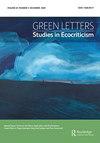倾听的亲密:珍妮·埃彭贝克的《去吧,去吧,去吧》中flnerie的新政治
Q1 Arts and Humanities
引用次数: 0
摘要
本文认为,珍妮·埃彭贝克(Jenny Erpenbeck) 2015年的小说《去吧,去吧,去吧》(2017年由苏珊·伯诺夫斯基(Susan Bernofsky)从德语翻译而来)中,行走的活动对于在主人公退休教授理查德(Richard)与抵达柏林后生活在危险环境中的有色难民之间建立一种独特的亲密关系至关重要。这表明,行走,作为一种行动,也是一种活动,在他与激进另类的谈判中引发了一种转变。这可以追溯到理查对行走的感知从审美愉悦到道德紧急事项的利用的逐渐转变。通过这种方式,本文研究了在Erpenbeck的小说中与各种各样的人进行情感和伦理交往的前提下,flalnerie的新伦理。本文章由计算机程序翻译,如有差异,请以英文原文为准。
The Intimacy of Listening: A New Politics of Flânerie in Jenny Erpenbeck’s Go, Went, Gone
ABSTRACT This article argues that the activity of walking in Jenny Erpenbeck’s 2015 novel Go, Went, Gone (translated from the German by Susan Bernofsky in 2017) is crucial in establishing a singular intimacy between its protagonist, the retired professor Richard, and the refugee-subjects of colour who live in precarious circumstances when they arrive in Berlin. It suggests that walking, as an action as well as an activity, triggers a transformation in his negotiations with radical alterity. This can be traced through a gradual shift in Richard’s perception of walking from an aesthetic pleasure to its utilisation in matters of ethical urgency. In this manner, it studies the new ethics of flânerie premised on affective and ethical engagements with various others in Erpenbeck’s novel.
求助全文
通过发布文献求助,成功后即可免费获取论文全文。
去求助
来源期刊

Green Letters
Arts and Humanities-Literature and Literary Theory
CiteScore
0.50
自引率
0.00%
发文量
38
期刊介绍:
Green Letters: Studies in Ecocriticism explores the relationship between literary, artistic and popular culture and the various conceptions of the environment articulated by scientific ecology, philosophy, sociology and literary and cultural theory. We publish academic articles that seek to illuminate divergences and convergences among representations and rhetorics of nature – understood as potentially including wild, rural, urban and virtual spaces – within the context of global environmental crisis.
 求助内容:
求助内容: 应助结果提醒方式:
应助结果提醒方式:


